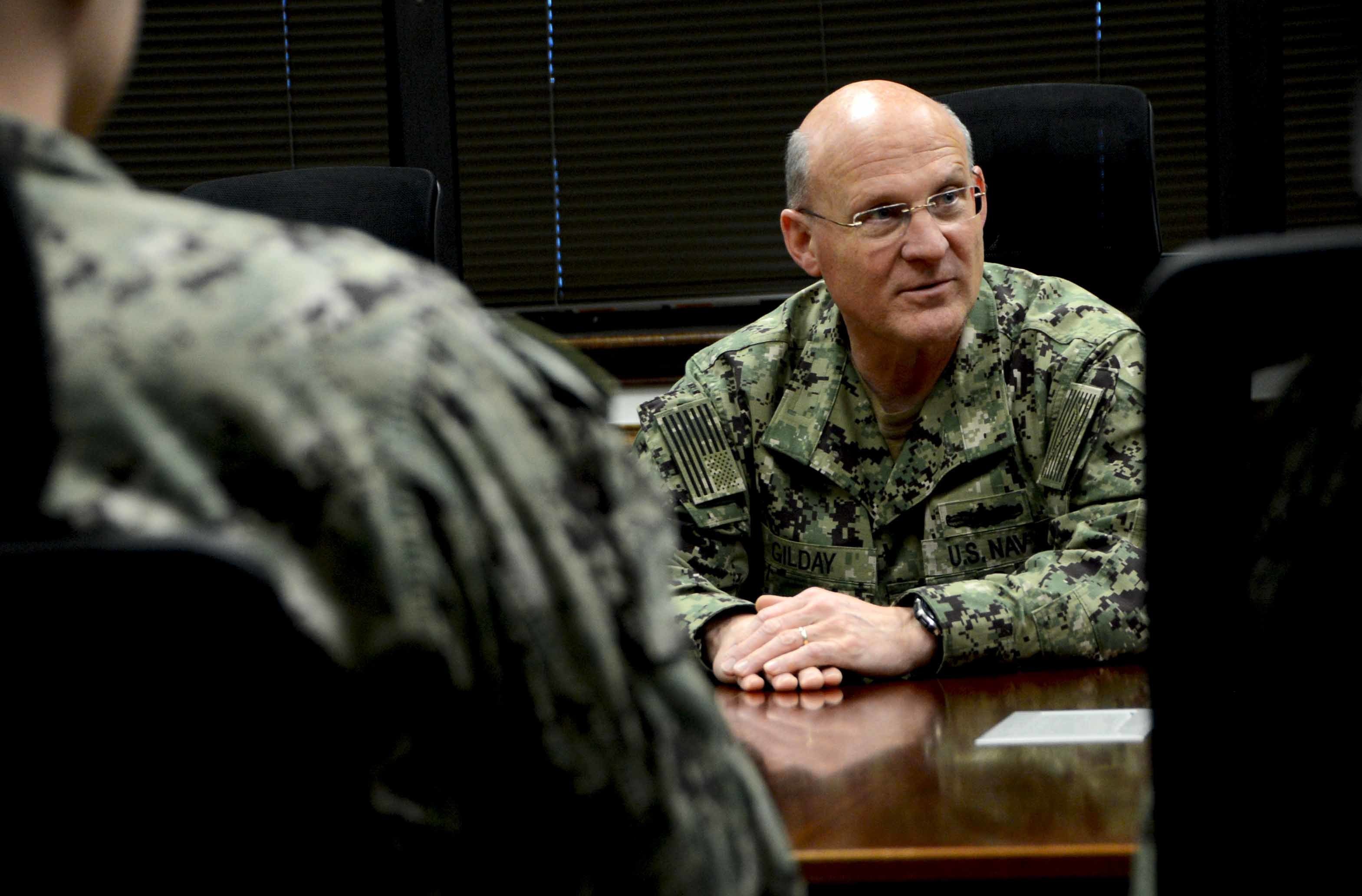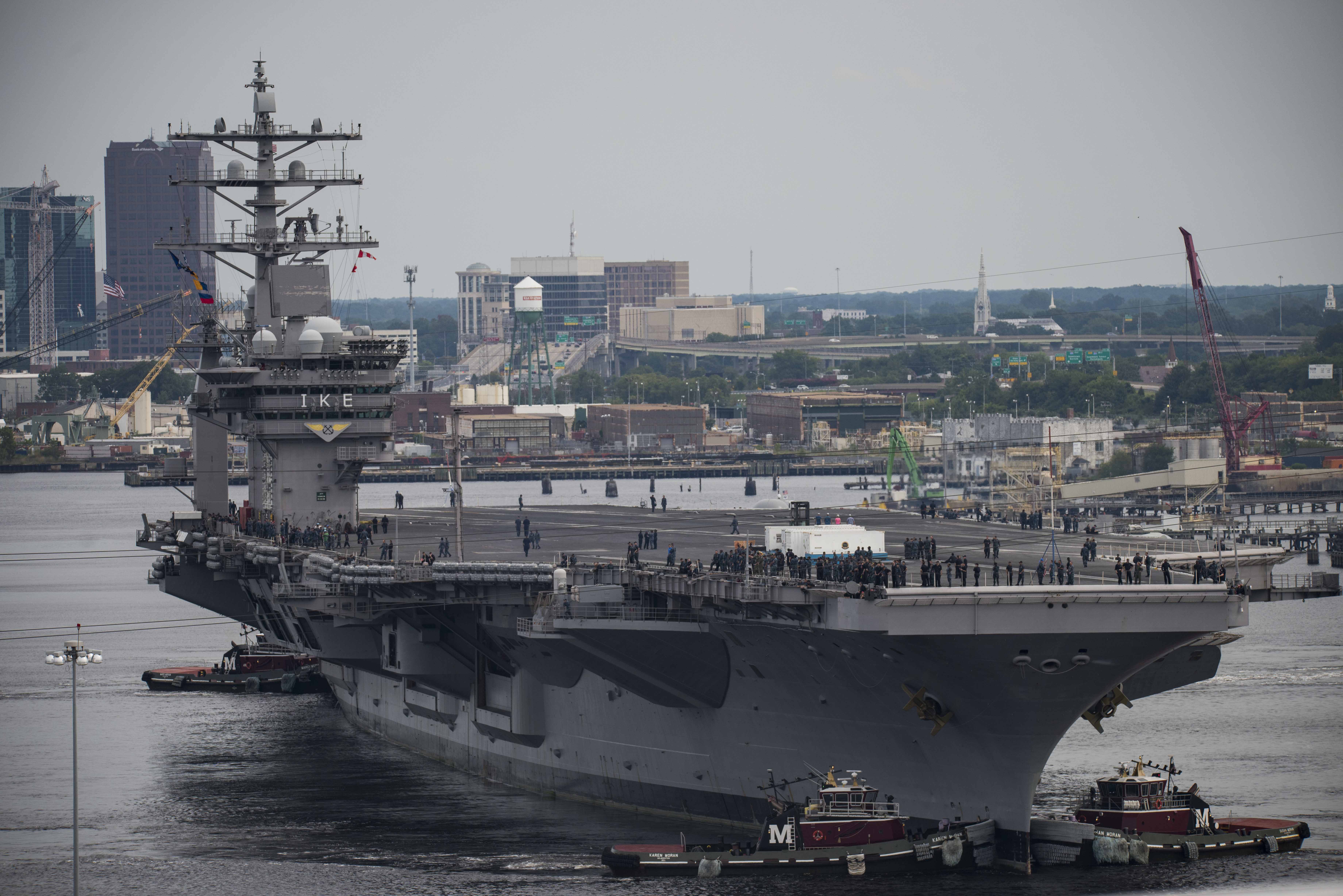
Chief of Naval Operations (CNO) Adm. Mike Gilday meets with Sailors during his visit to Naval Expeditionary Intelligence Command. US Navy Photo
SAN DIEGO, Calif. – The chief of naval operations defended the Navy’s force-generation model, saying that it could be tweaked to change the balance of deployed forces versus those ready to surge if needed – but the 36-month maintenance, training and deployment cycle fundamentally works.
Adm. Mike Gilday was responding to last week’s comments by Defense Secretary Mark Esper on the Optimized Fleet Response Plan. The SECDEF said the upcoming integrated naval force structure assessment was delayed in being publicly released because “an assumption in the INFSA is that the OFRP works. The OFRP hasn’t worked for years, so why should we assume it will work in the future?”
“I don’t necessarily agree with the secretary’s assessment – and I say that with all due respect. But we have made and are projecting into the future to continue to meet every commitment, every deployment that we’ve been directed to do,” Gilday said at the WEST 2020 conference cohosted by the U.S. Naval Institute and AFCEA.
Gilday previously worked as the director of operations on the Joint Staff, and through that lens he saw how OFRP and the Navy’s ability to project forces forward for presence and also to surge forward in an emergency would affect the entire military force.
When he took command as CNO in August 2019, he immediately asked U.S. Fleet Forces Command and U.S. Pacific Fleet to conduct an assessment of OFRP, he said, because “it had been five or six years since we put it into place, and I had questions myself coming out of the joint staff on plans that I had observed that, at a minimum, I thought we were going to have to buy more surge. Secretary Esper asked for a separate, independent assessment of OFRP – that’s ongoing.”
“I think at the end of the day, what we have to do is understand what the secretary of defense really wants with respect to either increased presence today or increased surge or a combination of both of those,” Gilday concluded.

The aircraft carrier USS Dwight D. Eisenhower (CVN 69) transits the Elizabeth River during the ship’s transit to Norfolk Naval Shipyard in Portsmouth, Va. in 2017. US Navy Photo
He said that the National Defense Strategy calls for being able to deter conflict by maintaining a credible surge force. Under OFRP, carrier strike group assets undergo maintenance and a training cycle for a combined 14 months, and then have about 22 months where they deploy for seven or eight months and then sustain readiness to either deploy again or to be held as a surge force. Gilday acknowledge that in the past the combatant commanders had been so eager for presence that they ate up surge capacity by requiring double deployments during that sustainment phase.
“If we want to change how we deploy within that 22 months, we can take a look at that, we can take a look at the cost of that,” he said of the balance between deploying versus remaining a credible ready surge force.
Gilday also noted that the maintenance portion of OFRP has been challenged by budget challenges like continuing resolutions and workforce shortages at the maintenance yards, but he said the Navy is very seriously addressing those issues.
But, he said strongly, OFRP as a 36-month cycle is working just fine.
Gilday’s remarks and Esper’s come after Vice Chief of Naval Operations Adm. Robert Burke said last fall that OFRP may need some tweaking, specifically to address the very issues of maintenance challenges and balancing deployed versus surge forces.
“Part of that is, you can’t use up that wartime capacity for things short of war, and wish you had it when you need it later. So we’re going to have to do a little bit of an appetite-suppressant on how many carriers we’re able to provide,” Burke said in October.
“There’s not one combatant commander on the planet on the U.S. side who will tell you they don’t need a carrier – or carriers, as the case may be. So they’re very much in demand, and I don’t think that’s much in contention right now.”
To ease pressure on the maintenance yards while they recover and to save surge forces for in case they are truly needed for a wartime scenario, Burke said the Navy would take a hard look at how it generates and employs ready forces.
